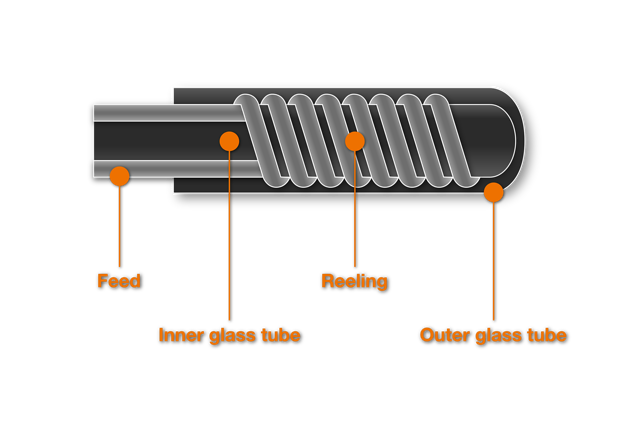Technical Information
2. Wound sensor resistances on glass bodies
Temperature range depending upon type of glass from -196°C to + 350°C and/or. 20°C to 450°C.
With these sensor resistances a glass thorn or a glass tube of platinum resistance wire is bifiliar wound and compared in accordance with the desired tolerance (limiting deviation).
Over this coil a further glass tube is melted. One differentiates between glass sensor resistances from hard and from soft glass. Glass sensor resistances made of hard glass are used in the temperature range from 20°C to +450°C. They are, mechanically and chemically, strongly resistant to stress. In addition are they quickly electrosensitive, since the measuring coil is directly under the surface. Disadvantages exist in that these resistances due to the different coefficients of expansion from hard glass and platinum tend to hysteresis , in addition the glass from approx. 350°C is electrically conductive and thereby causes low measurement values.
Sensor resistances from soft glass however have as good as no hysteresis behaviour, since platinum and soft glass expand alike. The maximum application temperature is however only approx. +350°C.
Sensor resistances from soft glass can be manufactured in minimum dimensions and are thus just as suitable for use in small and laboratory thermocouples as for surface measurements in which minimum spatial distance of sensor to the object to be measured, matters. These sensor resistances can, due to their construction, be immersed directly into the medium to be measured e.g. laboratory thermo sensor in liquid.
Resistances are to a large extent insensitive to oscillations/vibrations.
Choose your language
Leave your number and we’ll call you back
Your direct contact to our team
GÜNTHER GmbH
Temperaturmesstechnik
Bauhofstraße 12
D-90571 Schwaig
info@guenther.eu
Tel. +49 (0)911 / 50 69 95-0
Fax +49 (0)911 / 50 69 95-55












